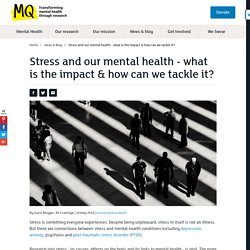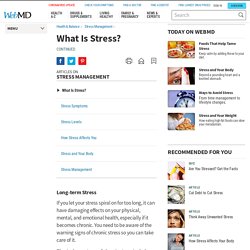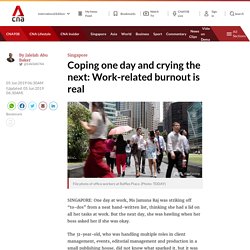

Physical Health. Mental Health. Our personalities affects how we respond to stressful situation. How does stress impact our mental health? Stress is something everyone experiences.

Despite being unpleasant, stress in itself is not an illness. But there are connections between stress and mental health conditions including depression, anxiety, psychosis and post-traumatic stress disorder (PTSD). Research into stress - its causes, effects on the body and its links to mental health - is vital. The more we understand stress, the better we can tackle it. In this blog, we explore the science of stress and mental health. Fight or flight Stress causes physical changes in the body. Long-term stress Many situations can cause a stress response in the body. When the stress response becomes prolonged (chronic), it has a very different effect to the short bursts that enhance the body’s abilities. Some of the emotional and behavioural symptoms of stress overlap with those of mental health conditions like anxiety or depression. The biology of mental health and stress The immune system Stress and PTSD Hope for the future Ways to help.
Stress - Why It Happens and Common Causes. We all deal with stress at some point in our lives.

Maybe it’s your job, a family illness, or money troubles. These are common triggers. According to a recent study, about half of all Americans say they’re dealing with moderate stress. But not all stress is bad. It can make you more aware of things around you and keep you more focused. What Causes Stress? Stress is different for everyone. Still, your bodies react the same to stressors. This is known as the body’s “fight-or-flight response.” 60% of Singaporean staff experience above average stress levels. Are Singaporean employers doing enough when it comes to health and well-being programmes?

It seems not. According to new research from Willis Towers Watson, local employers are still missing the mark, with many employees feeling that their needs are not being met. When it comes to work-related health issues, Willis Towers Watson’s earlier 2017 Benefits Trends Survey found that almost half (44%) of local employers identified stress as the number one health issue. In the same vein, 60% of employees admitted to having above average or high levels of stress. Despite this, the survey revealed only 27% of employers are actually taking action to reduce work-related stress. Apart from work related stress, global findings revealed that stress can also arise from financial insecurity. In Singapore, 27% of employees live paycheck to paycheck.
Perhaps for that reason, about three in 10 employees globally expect to work at age 70 or beyond. Photo / 123RF. Coping one day and crying the next: Work-related burnout is real. SINGAPORE: One day at work, Ms Jamuna Raj was striking off “to-dos” from a neat hand-written list, thinking she had a lid on all her tasks at work.

But the next day, she was bawling when her boss asked her if she was okay. The 31-year-old, who was handling multiple roles in client management, events, editorial management and production in a small publishing house, did not know what sparked it, but it was the start of her journey towards realising that she was experiencing burnout. “I was striking the to-dos off, but for every one that I did, there were five more. Still, because I was striking things out, I thought I could handle it,” she told CNA. At the time, she had multiple deadlines looming ahead of her. Her boss had checked on her because she had changed and her colleagues noticed it, said Ms Jamuna, a Singaporean who lives in Melbourne. “As soon as he (her boss) asked me that, I started bawling. READ: Commentary: What’s behind burnout? TODAYonline.
SINGAPORE — Miss Wee Sihui is only 22, but the former retail assistant, who started working full-time early this year, is suffering burnout from work and its accompanying symptoms of feeling constant exhaustion, negativity, dread and pessimism.

She used to work in a popular confectionery store and when there was a manpower crunch, she spent around 13 hours on her feet from 9.30am to around 10.30pm daily, juggling responsibilities meant for at least two employees. But it wasn’t just the physically punishing work routine that made her quit her job. The mental stress, fuelled by a lack of support at work, led to anxiety attacks. “I sometimes felt like I could not breathe. I had trouble handling the stress of multi-tasking tasks while looking after the store alone,” she said. “I didn’t tell my managers as I didn’t want to seem like a ‘complain queen’. The final straw came when Ms Wee came down with a bad case of flu in June. She quit her job recently to take a breather.